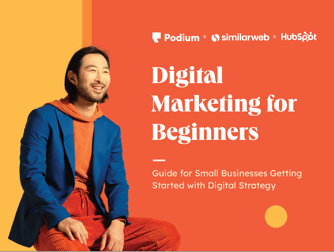-

The Email Marketing Strategies Beyoncé, Royal Caribbean, and Sprinkles Cupcakes ...
Discover how inclusive email marketing can enhance your subscription rates with strategies...
Sonia Thompson
3/17/25
-

Are In-Stream Video Ads Worth the Investment? [Benefits & Best Practices for Mar...
Master the art of in-stream video advertising with strategies designed to maximize visibil...
Pamela Bump
3/17/25
-

Everything Our Paid Team Learned From Attempting a Reddit Advertising Strategy
Is Reddit advertising the right move for your brand? Understanding the ins and outs of the...
Caroline Forsey
3/17/25
-

How This Small Startup Outperformed a Stalling Industry
Co-marketing, unexpected brand collaborations, and pickle cowboy boots. The secrets of The...
Curt del Principe
3/17/25
From HubSpot's video library
-
.jpg?height=240&name=YT-237_A%20(1).jpg)
How to Start Affiliate Marketing With No Experience or Money (4 Free Tools!)
-

How Airlines Really Make Money | Hustlenomics | The Hustle
-
.jpg?height=240&name=IMG_0735%20(1).jpg)
What Entrepreneurs Can Learn From Native Deodorant
-

Meet the Designer Behind the Iconic Nudie Suit | Unknown Empires
-

Tips For Elevating Your Next Go-To-Market Strategy (+ Free Templates)
-

Why T-Mobile Trademarked This Color | The Hustle
-
.jpg?height=240&name=YT-237_A%20(1).jpg)
How to Start Affiliate Marketing With No Experience or Money (4 Free Tools!)
-

How Airlines Really Make Money | Hustlenomics | The Hustle
-
.jpg?height=240&name=IMG_0735%20(1).jpg)
What Entrepreneurs Can Learn From Native Deodorant
-

Meet the Designer Behind the Iconic Nudie Suit | Unknown Empires
-

Tips For Elevating Your Next Go-To-Market Strategy (+ Free Templates)
-

Why T-Mobile Trademarked This Color | The Hustle
-
.jpg?height=240&name=YT-237_A%20(1).jpg)
How to Start Affiliate Marketing With No Experience or Money (4 Free Tools!)
-

How Airlines Really Make Money | Hustlenomics | The Hustle
-
.jpg?height=240&name=IMG_0735%20(1).jpg)
What Entrepreneurs Can Learn From Native Deodorant
-

Meet the Designer Behind the Iconic Nudie Suit | Unknown Empires
-

Tips For Elevating Your Next Go-To-Market Strategy (+ Free Templates)
-

Why T-Mobile Trademarked This Color | The Hustle
-

Testimonial Questions Reps Need to Ask Their Customers
Not all testimonials are created equal — use these 25 smart questions to capture customer ...
Ashley Valadez
3/17/25
-

How the Customer Journey Funnel Revamps Traditional Methods and Drives Business
See how the customer journey funnel helps businesses nurture leads, boost retention, and t...
Ashley Valadez
3/14/25
-

AI Intent — Figuring Out the Purpose that Drives Service Tech
AI intent is an AI system’s ability to understand the meaning behind a user’s input. Disco...
Kolawole Samuel Adebayo
2/21/25
-

Level Up Your POS Experience — Here's What Experts Have to Say
The POS experience is an important transactional moment for your customers. Here's why — a...
Nakul Kadaba
2/21/25

An Introduction to Digital Marketing
Learn the basics of digital marketing and explore different ways to reach your ideal customer.
-

8 Common Ways Sales Professionals Waste Their Time (& How to Avoid Them), Accord...
Efficiently allocating your time can be tricky in sales. See eight common time wasters you...
Jay Fuchs
3/17/25
-

I Tried Three Generative AI CRMs: Here Are My Thoughts
Want to harness the power of AI in your sales strategy? See how these 3 generative AI CRMs...
Zoe Ashbridge
3/17/25
-

How Sales Mirroring Can Help You Close Business, According to Experts
Understanding how to effectively mirror prospects during sales conversations is the secret...
Doug Bonderud
3/17/25
-

Business Ethics — Why They Matter and How Your Company Can Get it Right [+Expert...
Good ethics mean better business — find out how to embed transparency, accountability, and...
Kasia Kowalska
3/14/25
From the HubSpot Podcast Network
-
Business Made Simple

Your Website Probably Stinks—Here’s How to Fix It!
-
The Science of Scaling

How to Scale a Billion Dollar Sales Team w/ John McMahon (Board Member, Snowflake)
-
Truth, Lies and Workplace Culture
-2.png?height=240&name=PodcastCovers23%20(1)-2.png)
From Bystander to Ally: How to Avoid DEIB Washing
-
Imperfect Action
-2.png?height=240&name=PodcastCovers23%20(4)-2.png)
The art of the post-launch review: 5 questions to make your next launch a success
-
Latinx In Power
.png?height=240&name=PodcastCovers23%20(6).png)
Harnessing the Power of Silence in Negotiation with Diana Kleps
-
The Sales Evangelist

5 Ways To Do Daily Outbound With LinkedIn
-
Business Made Simple

Your Website Probably Stinks—Here’s How to Fix It!
-
The Science of Scaling

How to Scale a Billion Dollar Sales Team w/ John McMahon (Board Member, Snowflake)
-
Truth, Lies and Workplace Culture
-2.png?height=240&name=PodcastCovers23%20(1)-2.png)
From Bystander to Ally: How to Avoid DEIB Washing
-
Imperfect Action
-2.png?height=240&name=PodcastCovers23%20(4)-2.png)
The art of the post-launch review: 5 questions to make your next launch a success
-
Latinx In Power
.png?height=240&name=PodcastCovers23%20(6).png)
Harnessing the Power of Silence in Negotiation with Diana Kleps
-
The Sales Evangelist

5 Ways To Do Daily Outbound With LinkedIn
-
Business Made Simple

Your Website Probably Stinks—Here’s How to Fix It!
-
The Science of Scaling

How to Scale a Billion Dollar Sales Team w/ John McMahon (Board Member, Snowflake)
-
Truth, Lies and Workplace Culture
-2.png?height=240&name=PodcastCovers23%20(1)-2.png)
From Bystander to Ally: How to Avoid DEIB Washing
-
Imperfect Action
-2.png?height=240&name=PodcastCovers23%20(4)-2.png)
The art of the post-launch review: 5 questions to make your next launch a success
-
Latinx In Power
.png?height=240&name=PodcastCovers23%20(6).png)
Harnessing the Power of Silence in Negotiation with Diana Kleps
-
The Sales Evangelist

5 Ways To Do Daily Outbound With LinkedIn
-

25 Webinar Landing Page Examples to Copy in 2025 [+ Design Tips]
Learn how to design a high-converting webinar landing page, and check out 25 of our favori...
Jamie Juviler
3/17/25
-

Bluehost Review: Is it Good for Newbie Bloggers?
Discover the truth in this Bluehost review. We'll cover key features, pros, and cons so yo...
Anna Fitzgerald
3/17/25
-

Website Quality Assurance: How I QA My Website for Maximum Impact
Learn the importance of website quality assurance, with tips and expert insights to ensure...
Darrielle Evans
3/13/25
-

Creating a Web Design Contract That Keeps Your Project on Track [+ Expert Tips]
Learn from experts how to create a web design contract that protects your business, sets c...
Jenny Bergen Clark
3/13/25
-

HTML Form Templates [50+ Best Examples]
These are the 50+ best HTML Form templates for login forms, signup forms, contact forms, s...
Madhu Murali
3/13/25
-

Drag-and-Drop HTML Editor: Elevate Your Site With My Favorite Builders
Learn how the best drag-and-drop website builder can help your content strategy. Then, exp...
Alex Girard
3/13/25
Explore more topics
Ready to brush up on something new? We've got more to read right this way.






.png)
